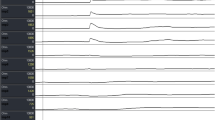Abstract
In this observational study of patients with multiple sclerosis (MS) admitted to a regional neurology centre we assessed the frequency of dysphagia (objectively defined), dysphagia related symptoms, bulbar signs and nutritional status. We studied 79 consecutive admissions with MS (24 at diagnostic admission and 55 more advanced cases admitted for treatment and/or rehabilitation): normative swallowing data were from 181 healthy controls. Swallowing symptoms and signs were semi-quantitatively measured and compared to healthy controls. Dysphagia was defined by a quantitative water test. Disability was determined by Kurtzke’s Expanded Disability Status Scale and Barthel’s index. Nutritional status was assessed by body mass index, estimated percentage body fat from skin fold thickness measurements at four sites, a global evaluation of nutrition, the presence of pressure sores and the pressure sore risk using the Waterlow score. Patients with MS were more likely to complain of abnormal swallowing, of coughing when eating, and of food ‘going down the wrong way’ than healthy controls (P < 0.005). These significantly associated symptoms had high specificity but relatively low sensitivity. 43% of patients had abnormal swallowing, almost half of whom did not complain of it: abnormal swallowing was associated with several factors including abnormal brainstem/cerebellar function, disability, vital capacity, and depression score. Those with abnormal swallowing had higher Waterlow scores (P < 0.001), but, overall, abnormal swallowing was not associated with a difference in nutritional indices or incidence of pressure sores. In summary, abnormal swallowing is common in MS although often not complained of. It is associated with disordered brainstem/cerebellar function, overall disability, depressed mood and low vital capacity. It was not associated with major nutritional failure or pressure sores in this study.
Similar content being viewed by others
Author information
Authors and Affiliations
Additional information
Received: 16 June 1998 Received in revised form: 29 October 1998 Accepted: 19 January 1999
Rights and permissions
About this article
Cite this article
Thomas, F., Wiles, C. Dysphagia and nutritional status in multiple sclerosis. J Neurol 246, 677–682 (1999). https://doi.org/10.1007/s004150050431
Issue Date:
DOI: https://doi.org/10.1007/s004150050431




